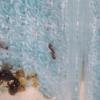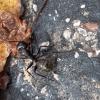- Formiculture.com
- Forums
- Gallery
- Members
- Member Map
- Chat

Question about polygynos queens.
Started By
LIExotics
, Apr 15 2022 6:19 PM
4 replies to this topic
#1
 Offline
-
Posted April 15 2022 - 6:19 PM
Offline
-
Posted April 15 2022 - 6:19 PM
Hey everyone. So while I was on an ant looking trip today, I found a bunch of Camponotus subbarbatus queens, male elates, and even a bunch of workers. I posted here too ID the species, and after having it ID'd, I did some research and found that this species of carpenter ant is naturally polygynos, and that they normally keep their wings on for the duration of their life. So here's my question. Being that there are a bunch of workers, and not just male and female elates, there's a good chance it was just an active colony I found. So, if it was an active colony, and I took 8 queens out of about 30 that I saw, will these ants that I grabbed still produce eggs, and raise them, and start new colonies?
Just as a clarification, I only saw the workers in the ground AFTER I had already grabbed the queens. Normally, if I see a queen, and there are workers, I assume they are a colony and leave them alone. I do not want to take a queen away from a colony. So, I try to leave ant queens I find with a colony. And if I find a lone queen, I will search everywhere to make sure she doesn't have a colony somewhere. So, just making sure I clarify that. When I flipped over the log, there were a bunch of queens and male elates, and I just started grabbing a bunch of them.
So, I just want to know if polygynos queens will start new colonies if taken away from the existing colony. Thanks everyone.
Just as a clarification, I only saw the workers in the ground AFTER I had already grabbed the queens. Normally, if I see a queen, and there are workers, I assume they are a colony and leave them alone. I do not want to take a queen away from a colony. So, I try to leave ant queens I find with a colony. And if I find a lone queen, I will search everywhere to make sure she doesn't have a colony somewhere. So, just making sure I clarify that. When I flipped over the log, there were a bunch of queens and male elates, and I just started grabbing a bunch of them.
So, I just want to know if polygynos queens will start new colonies if taken away from the existing colony. Thanks everyone.
#2
 Offline
-
Posted April 15 2022 - 6:34 PM
Offline
-
Posted April 15 2022 - 6:34 PM
If you caught the queens with wings from a colony, they are likely virgin alate queens that haven’t mated yet. This is especially likely considering you found male alates with them
Edited by Manitobant, April 15 2022 - 6:35 PM.
- Chickalo likes this
My journals:
Polyergus Mexicanus: https://www.formicul...gs/#entry175528
Lasius minutus: https://www.formicul...cs/#entry174811
Lasius latipes: https://www.formicul...gs/#entry206449
General acanthomyops journal: https://www.formicul...yops-with-eggs/
Polyergus Mexicanus: https://www.formicul...gs/#entry175528
Lasius minutus: https://www.formicul...cs/#entry174811
Lasius latipes: https://www.formicul...gs/#entry206449
General acanthomyops journal: https://www.formicul...yops-with-eggs/
#3
 Offline
-
Posted April 15 2022 - 6:37 PM
Offline
-
Posted April 15 2022 - 6:37 PM
If you caught the queens with wings from a colony, they are likely virgin alate queens that haven’t mated yet. This is especially likely considering you found male alates with them
Agreed.
My YouTube Channel.
My Ant Store: https://www.missouriantshop.com/
#4
 Offline
-
Posted April 15 2022 - 7:13 PM
Offline
-
Posted April 15 2022 - 7:13 PM
Yes, agreed. They're almost certainly not mated. The presence of workers itself indicates that the queens are just emerging from their parent colony. If they had already mated, they would be completely on their own.
This is especially likely considering you found male alates with them
I'd say the workers are a better indicator than the males; if you found a bunch of queens and males on the sidewalk somewhere, they could be mating currently.
"God made..... all the creatures that move along the ground according to their kinds (including ants). And God saw that it was good. Genesis 1:25 NIV version
Keeping:
Formica cf. pallidefulva, cf. incerta, cf. argentea
Formica cf. aserva, cf. subintegra
Myrmica sp.
Lasius neoniger, brevicornis
#5
 Offline
-
Posted April 16 2022 - 5:36 AM
Offline
-
Posted April 16 2022 - 5:36 AM
Wait for nuptial flights. Please don’t continue disrupting established colonies like this.
- Manitobant likes this
"The ants are a people not strong, yet they prepare their meat in the summer." Prov. 30:25
Keep ordinary ants in extraordinary ways.
Keep ordinary ants in extraordinary ways.
0 user(s) are reading this topic
0 members, 0 guests, 0 anonymous users


















